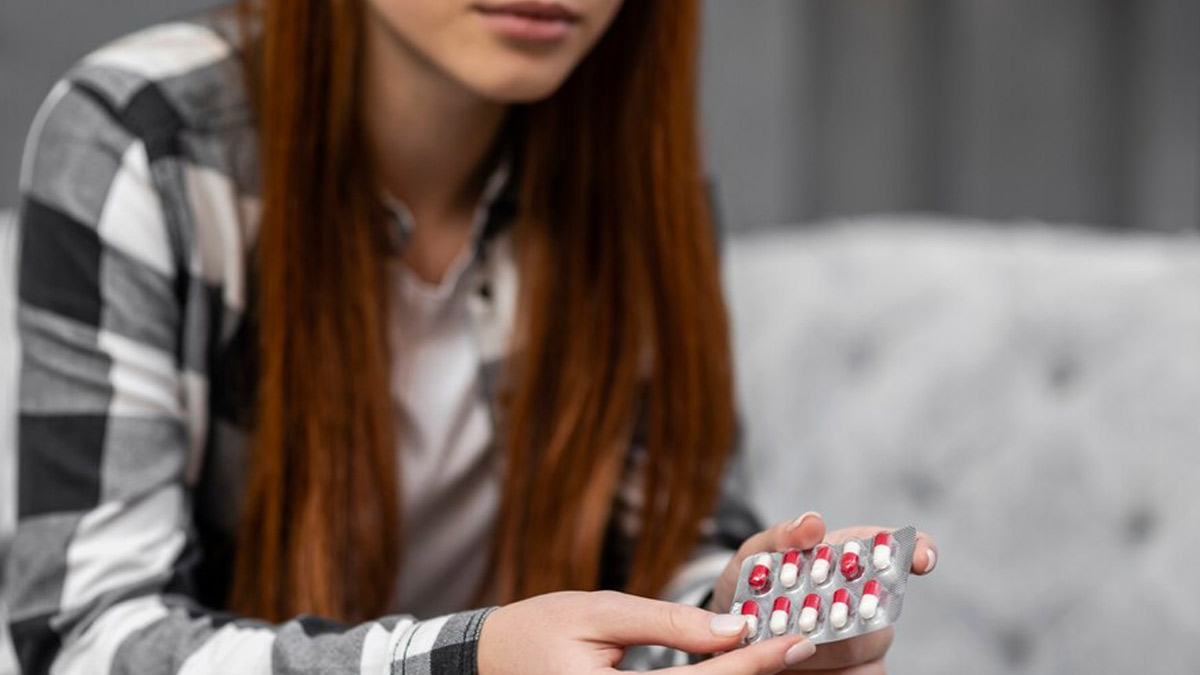
Are you someone who experiences period cramps that are too painful to bear? Painful periods not only affect your day-to-day activities but also lead to increased stress levels. It can range from moderate pain to intolerable levels of pain, causing a lot of discomfort. However, each person's level of pain may differ and not always be the same. You might think of using a painkiller in these circumstances to help with the discomfort, but are the tablets safe to take? We spoke to our expert Dr Vidyashri C Kamath, KMC Hospital, Mangalore, who explained the consequences of taking painkillers and listed alternatives to reduce period pain.
Table of Content:-

Period discomfort is a result of your body secreting ‘prostaglandins’, which aid in squeezing your uterus and expelling the blood associated with your period. According to the Institute for Quality and Efficiency in Health Care (IQWiG), 10 out of 100 women experience pain so severe that it prevents them from performing their regular daily tasks one to three days every month.
How Do Painkillers Work?
“Most period painkillers work by relaxing your uterine muscles thereby relieving pain. On the other hand, regular painkillers work by reducing this prostaglandin activity and reducing pain”, informed Dr Kamath.
She emphasised, “One should not overdose on the pills. Do not consume more than one every eight hours for a day or so. If taken in excess, painkillers might damage your stomach and kidneys. “
Also Read: Do You Take Painkillers During Periods? Expert Lists The Dos And Don'ts
Side Effects Of Taking Painkillers To Relieve Menstruation Pain

You should not take painkillers until your gynaecologist advises you. This is because it can lead to various negative effects and Dr Kamath listed some of them as follows:
- Your menstrual cramps can be making things difficult for you already. Now, if you take painkillers regularly throughout your period, you will also need to deal with constipation
- Acid reflux and stomach pain are the other commonly seen unpleasant side-effects of taking painkillers due to gastritis. In extreme cases, it can also cause stomach ulcers
- You will feel dizzy after taking a pill while on your period. It will be hard for you to concentrate on the work
- Diarrhoea
- Nausea and vomiting
- Irregular heartbeat and chest tightening
“You should consult a doctor if medicines are not working to lessen your discomfort or if it is severe. There could be an underlying condition like endometriosis, fibroids or ovarian cysts that need investigation”, added Dr Kamath.
Expert Tips To Reduce Period Pain
Period discomfort can be reduced by making some lifestyle adjustments in addition to the many available medical therapies. Dr Kamath listed some of them as follows:

- Maintain a healthy diet: Eat a diet rich in fruits, vegetables, whole grains, lean proteins, and other nutrients.
- Keep yourself hydrated: Sip a lot of water throughout the day. During your menstrual cycle, staying hydrated can help minimise bloating and improve your general well-being.
- Exercise regularly: Engage in regular exercise, such as swimming, yoga, or walking. Endorphins are natural painkillers released during exercise that can help reduce the discomfort associated with menstruation.
- Apply heat: Place a hot water bottle or heating pad on your lower abdomen. Heat can ease pain, lessen cramps, and relax muscles.
- Practise relaxation techniques: You should consider trying stress-reducing techniques, such as deep breathing exercises, meditation, or gentle stretching. These methods can ease period pain, release tension, and help the body relax.
- Sleep well: Avoid staying up late at night and aim for 6-8 hours of sleep by maintaining a consistent sleep schedule.
Also Read: Do You Take Painkillers Everyday? Expert Lists Side Effects And Risk Factors
Must Do Things To Reduce Period Pain

Apart from the above-listed measures, Dr Kamath listed some must-do tips that you should follow:
- Restrict your caffeine intake: Coffee, tea, and energy drinks contain high amounts of caffeine.
- Reduce alcohol consumption: Alcohol consumption during menstruation can intensify discomfort due to dehydration and inflammation. It is advisable to avoid or limit the intake of alcohol during this time.
- Minimise salt intake: Consuming salt in excess amounts can lead to water retention and bloating, amplifying menstrual discomfort. Hence, aim to consume less salt throughout this period.
- Avoid smoking: You should avoid smoking as it worsens menstrual symptoms.
- Don't skip meals: Continue your usual eating schedule and refrain from missing meals. Eating balanced meals gives you the energy and vital nutrients you need to be healthy overall.
- Restrict your intake of processed and sugary meals: These foods might exacerbate period pain by causing bloating and inflammation. Instead, choose healthier substitutes.
- Don’t ignore your body’s needs: Focus on your body's needs and give breaks when required. Overexerting yourself while menstruating can make you feel more exhausted and uncomfortable.
[Disclaimer: This article contains information provided by a registered healthcare professional and is for informational purposes only. Hence, we advise you to consult your expert if you are dealing with painful periods to take necessary measures.]
Also watch this video
How we keep this article up to date:
We work with experts and keep a close eye on the latest in health and wellness. Whenever there is a new research or helpful information, we update our articles with accurate and useful advice.
Current Version